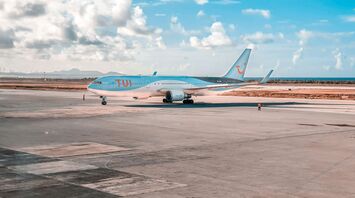TUI Airways Boeing 737-800 Autothrottle Failure Leads to Incident at Bristol Airport

On March 4, 2024, a TUI Airways Boeing 737-800 experienced an autothrottle failure during takeoff from Bristol Airport (BRS), resulting in the aircraft crossing the runway at a height of only 10 feet (3 meters). The United Kingdom Air Accidents Investigation Branch (AAIB) has released a preliminary report detailing the incident.
The incident involved TUI Airways flight G-FDZS, which was en route from Bristol to Las Palmas Gran Canaria Airport. The aircraft, with six crew members and 163 passengers, took off with insufficient thrust due to incorrect settings and a disengaged autothrottle.
Investigators noted that the thrust was manually set to 84.5% N1 instead of the required 92.8% N1. Despite standard operating procedures, this error went unnoticed by the pilots. The autothrottle disengaged during the takeoff roll, contributing to the insufficient thrust.
The AAIB's report highlighted that the takeoff thrust was set manually after the autothrottle disengaged, but the correct thrust level was not achieved. The pilots were unaware of the incorrect settings and continued the takeoff, resulting in the aircraft barely clearing the end of the runway.
According to the report, the flight continued to Las Palmas without further incident, although the pilots attempted to re-engage the autothrottle multiple times. The investigation revealed that the autothrottle system logged several faults related to the disengagement during the flight.
The AAIB identified five faults linked to the autothrottle disengagement, with the primary suspect being the autothrottle servo motor (ASM) for the number one engine. This issue is not new; Boeing has acknowledged a history of "nuisance disconnects" in the autothrottle systems of Boeing 737 Next Generation aircraft.
Boeing issued a service bulletin in October 2021, recommending the replacement of older ASMs to mitigate this issue. The TUI Airways aircraft in question was still equipped with the older model. The AAIB emphasized the importance of implementing flight data monitoring algorithms to detect takeoff events that may otherwise go unnoticed.
The preliminary report concludes that human error and technical failures contributed to the serious incident. A final report will be issued after the investigation is complete. In the meantime, the TUI Airways aircraft has returned to service after a brief suspension for maintenance checks.



















